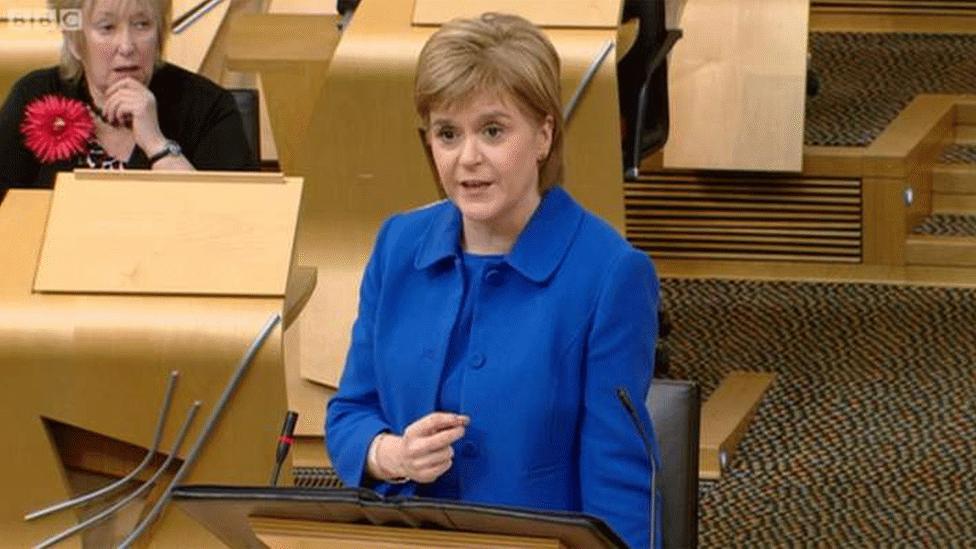First Minister's Questions: The art of the sedentary intervention
- Published

Nicola Sturgeon was again questioned by Kezia Dugdale over property deals linked to MP Michelle Thomson
There was much resort at Holyrood today to the practice known as sedentary intervention. This can range from vitriolic, crimson-faced heckling to taut one-liners, delivered sotto voce.
Winston Churchill, of course, was the master of the latter. In his dog days, out of government, he would sit on the front bench of the Commons, immediately below the gangway. (The position occupied, in later times and on different sides, by Edward Heath and Dennis Skinner.)
It was his habit to lean back, seemingly less than attentive. One aggrieved opponent inquired: "Must you sleep when I am speaking?" Without stirring, Churchill delivered the laconic reply: "No, it is entirely voluntary."
In any event, whether it is the droll put-down or the scarlet rant, those in the chair tend to be agin sedentary interventions. Up with them they will not put.
So it was with Tricia Marwick, the presiding officer today. But, wisely, she varied her tone to reflect the relative severity of the offence.
Towards the close of questions, Nicola Sturgeon was being chided, elegantly and effectively, by Murdo Fraser over the level of Scottish government under-spend. The Conservative MSP pursued his case with wit and, worse for Ms Sturgeon, with evidence.
There was a notable harrumph from the bench next to the first minister. Could that be a sedentary intervention from her deputy, whose day job is that of finance secretary? It could.
Subtle offender
John Swinney might have got away with it. But he was instantly outed - and by his boss. Just in case anyone had not heard, Nicola Sturgeon informed the chamber that Mr Swinney had accused the Tories of "financial illiteracy."
Now a pedant might suggest that the apposite word would be "innumeracy". But no matter. Mr Swinney had been named. And, you know what, he is a serial if subtle offender. Occasionally, it is the remark comical. Occasionally, it is spluttering indignation. Always very welcome in the chamber, if not from the chair.
However, Ms Marwick sensibly pursued the course of mercy. Very gently - and with an end of term smile - she suggested that Mr Swinney might confine his remarks to the occasions when he is on his feet.
Earlier, however, the PO had to intervene rather frequently - and rather more bluntly. Labour's Kezia Dugdale had opted for the second week running to question the first minister about the controversy surrounding the MP Michelle Thomson who has quit the SNP whip following questions about her business affairs.
Ms Dugdale invited the FM to urge the Law Society to hold an investigation into what they knew and when about the relationship between Ms Thomson and a solicitor who was struck off.
Cue sundry sedentary interventions. The SNP benches rang with cries of "ridiculous". Ms Sturgeon caught the mood - or perhaps it reflected her predisposition. She too said it was a ridiculous suggestion, noting that she had no power whatsoever over the autonomous Law Society.
Ms Sturgeon noted further that police investigations were under way, along with a referral to the Standards Commissioner at Westminster. She urged everyone to await the outcome of those inquiries, adding once more that serious allegations had been made which, if proven, would be unacceptable.
The FM's answer thus far had blended legalistic caution - she is a solicitor, after all - with overt exasperation at the question being raised again.
'Sanctimonious lectures'
Exasperation finally triumphed. "With the greatest of respect", she opined, her steady, aggrieved tone indicating precisely the opposite. Immediately, the mood in the chamber was: "Oh, look out!"
Grimly, the FM continued. She was not, she said, open to "sanctimonious lectures" from a party which, during the last Westminster session, had seen five MPs or former MPs sent to jail.
Utterly undeterred, Ms Dugdale persisted. She welcomed Ms Sturgeon's agreement that the Law Society might usefully publish its documents on the case (although the FM stressed again she had no power to order such publication.)
Indeed, Ms Dugdale described this as "progress". Cue further sedentary interventions from the SNP. "I welcome the answer and still they groan", commented the Labour leader. Said groans were perhaps a vocal suggestion that Ms Dugdale was making much of a commonplace reply.
Ms Dugdale's conclusion was that Ms Thomson should not be welcomed back as an SNP MP. Ms Sturgeon suggested, yet again, that it might be wise to await inquiries first. And there we have it.
But by then the mood was up. The Conservative leader Ruth Davidson also provoked sedentary interventions when she attempted to challenge the bill to shake up the governance of Scotland's universities.
Ms Davidson reflected widespread concern in university circles that the bill might erode their autonomy, permit government interference and even threaten their charitable status.
Ms Sturgeon contested her view. She offered evidence to rebut the charity claim, while insisting that the reform was designed to ensure that university governance was "transparent and inclusive."
The FM went on to praise Scotland's universities, noting that no fewer than five were in the global list of the top 200: the best performance per capita on the planet.
Yes, said Ms Davidson, and every one of those five universities had spoken out vigorously against the bill.
Ms Sturgeon again countered her claims while noting that there was an "opportunity to be constructive" over the issue. Even now, you can bet that Scotland's universities are preparing further "constructive" suggestions. Noises off, rather than sedentary interventions.